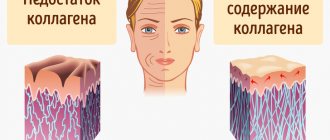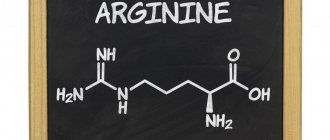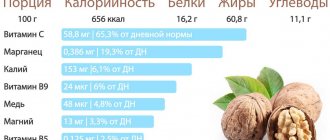Arginine is considered a conditionally essential amino acid, which is formed in the body if certain conditions are created for this. It is not synthesized enough in childhood and during illnesses, in which case it must come from outside. Increased amounts of the amino acid are required by bodybuilders and weightlifters, as well as people experiencing excessive physical exertion.
Its synthesis may be suspended due to chemotherapy and antibiotics. With its deficiency, health problems begin, so in order to feel good, you need to know which foods contain arginine and introduce them to the menu.
Compound
In its free form, this amino acid is not attached to protein or other compounds.
Arginine is essential for the human body for many reasons. It is one of three substrates for the formation of creatine, an essential nutrient compound, the deficiency of which causes mental retardation. It is used in the body and in the reproduction of agmatine, a signaling molecule, in the urea cycle it is an intermediate component in combination with L-ornithine and L-citrulline.
Arginine also promotes protein synthesis and stimulates the release of insulin. As part of the nitric oxide cycle, the compound provides significant benefits to physically active people. This makes it a popular dietary supplement for athletes.
L-arginine supplements come in capsules or powders. Both forms are equally effective, however, the former may require 2 to 3 doses per day, while the latter usually requires only one. Powders also provide faster results because the body absorbs them faster, but they must be mixed with liquid before ingestion.
Also commercially available are creams with L-arginine, which are used to improve blood circulation. Injections of the substance can only be carried out under the supervision of a physician.
Where to buy arginine
buy arginine at a low price in an online store in Moscow at. We sell products from leading sports nutrition manufacturers at reasonable prices. A wide range of products will help you choose a supplement that suits you in all respects. Capsules, tablets, powder, convenient shakers for taking and diluting the product, small packages that are comfortable to carry in your bag, and large jars that will allow you to save even more.
You can place an order around the clock. Delivery in a way that suits you (possible delivery by courier in Moscow to your home). Cash and non-cash payments.
buy arginine
Usage rate
Arginine in food products (a comparative table indicates its amount in each type of food) rich in protein can satisfy the physiological needs for it in most people.
Adults consuming the recommended daily allowance of protein (0.8 g/kg body weight) receive 0.25 mmol of arginine per kg of body weight. On average, proper nutrition provides the body with approximately 3-6 g of this amino acid per day.
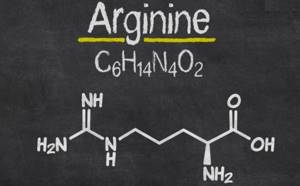
However, it may not be enough for people with certain conditions, such as severe burns, sepsis and HIV/AIDS, or for those who participate in active sports. If you take arginine as a dietary supplement, the usual dose is 2-3 g, 3 times a day. However, you can consume up to 20 g of this substance daily without causing side effects.
However, you should always check the dosage indicated on the packaging before taking a dietary supplement. It is recommended to take arginine with meals to avoid the onset of laxative effects.
The dosage of arginine in the form of a dietary supplement and the duration of the course may vary, depending on the purpose of administration:
- For chest pain and angina: 2-6 g three times a day for 1 month.
- For erectile dysfunction: 2.5-5 g per day. Taking lower doses may not be effective.
- For high blood pressure: 4-24 g per day for 2-24 weeks.
- For narrowing of blood vessels causing poor blood flow to the extremities (peripheral artery disease): 6-24 g daily for up to 8 weeks.
- For complications of pregnancy accompanied by high blood pressure and protein in the urine (preeclampsia): 3 g per day for 3 weeks.
- For high blood pressure during pregnancy: 4 g per day for 10-12 weeks.
For severe intestinal disease in premature infants (necrotizing enterocolitis or NEC), arginine is added to oral feedings daily at a dose of 261 mg/kg for the first 28 days of life.
Important facts about arginine
Arginine plays an important role in the regulation of blood vessels, so it is used for:
- fight against atherosclerosis (vascular calcification)
- erectile dysfunction treatment
- promoting healthy muscle growth
- strengthening the immune system
- improving insulin sensitivity in diabetics
- improving blood circulation in capillaries (for example, with tinnitus or hair loss)
Arginine is present in large quantities in walnuts and pine nuts. It is found in smaller quantities in milk, cheese, raw pork and chicken. Remember that as food is cooked, the amount of arginine in it will decrease.
When it comes to keeping the body healthy, arginine is probably the most important amino acid. It is the sole precursor to nitric oxide, meaning it plays a critical role in maintaining circulation and blood pressure at optimal levels. Cases of overdose of this amino acid are practically excluded. Even the extremely high dose of 30,000 mg per day is considered safe. It may cause only minor side effects, such as stomach upset or diarrhea. Regardless, it is very important to take arginine in the right doses to reap all of its benefits. Always buy a quality product (locally produced) that is subject to strict quality control. This will give you a guarantee that the supplement has all the necessary beneficial properties.
To achieve long-lasting effects, arginine should be taken continuously. After approximately 4-8 weeks of use, you will be able to observe positive changes in your body. It can take a long time to replenish this amino acid and improve your overall health. So do not be discouraged if after 1-2 weeks the effect of taking it is barely noticeable.
Although a single dose can reach more than 15,000 mg, it is preferable to take 1000-2000 mg of arginine 2-3 times a day with a glass of water.
Recommended doses of arginine depending on the purpose of administration
As an immunostimulant, 3000-5000 mg per day. For severe catabolic conditions, 10,000-20,000 mg along with omega-3 fatty acids.
To lower blood pressure At the initial stage, it is recommended to take 3000 mg, then the dose should be increased to 5000-8000 mg per day.
To protect against atherosclerosis To prevent hardening of the arteries (atherosclerosis), it is recommended to take 5000-9000 mg per day. It also reduces the risk of platelet accumulation.
For the treatment of erectile dysfunction, 3000-5000 mg per day. In some cases, the dosage may be increased to 10,000 mg*.
To improve male fertility To improve sperm motility and/or sperm quality, take 3000-5000 mg per day. Fertility should improve within 2-3 months.
For diabetes: Small doses of 3000 mg per day can be very effective in lowering blood sugar levels.
For the treatment of atherosclerosis 3000-5000 mg.
For the treatment of tinnitus 3000 mg.
To improve muscle growth, 2000-5000 mg in combination with other amino acids, especially BCAA.
For hair loss, 500 mg per day in combination with a comprehensive nutrition program.
*It is very important to note that arginine may enhance the effects of medications. If you are taking PDE5 inhibitors or any other medications, consult your doctor before adding arginine to your diet.
The recommended dose in this case is based on scientific evidence according to medical research.
With a daily dose of arginine of 15,000 mg, there is no evidence of side effects. With this dosage, hypertensive patients experience a decrease in blood pressure. Also, this amount of arginine can strengthen the immune system. Please consider the following points:
• arginine should not be taken by persons with an acute form of herpes simplex • divide the daily dose of arginine into 2 doses (morning and evening) so that the stomach can adapt to the pure substance. It is recommended to start with small doses and then gradually increase. • Consult your doctor if you regularly take any prescribed medications. Particular caution should be used when taking arginine in combination with PDE5 inhibitors. Arginine significantly enhances the effect of potency enhancing drugs. Never buy PDF5 inhibitors online, only at the pharmacy.
Pharmacies sell a number of specialized arginine products that may be helpful to you: • Atherosclerosis: Telcor® Arginine is a well-known and proven product for common vascular problems.
• Erectile dysfunction: The most famous supplement brands here are M forte, VIGARIN and ArginMax. "M forte" and "VIGARIN" have the best price/quality ratio. They contain an optimal daily dose of arginine of 3000 mg, which is recommended by Nobel Prize winner, pharmacologist Luis Ignarro. These 2 supplements are the best for treating erectile dysfunction. • Hair loss: Of the dozen or so products for the treatment of hereditary hair loss (androgenetic alopecia) on the UK market, only Hair Plus contains arginine.
• Male Fertility: A large number of male fertility supplements are sold in the UK, containing varying daily dosages of arginine. These include Wellman Conception (10mg), Pregnapure (150mg), Vitamen (200mg), Profertil and Fertilman (250mg), as well as fertilsan M (500mg). Please click here to compare fertility supplements.
• Tinnitus: In the UK, Clear Tinnitus is the most popular tinnitus supplement.
Arginine is necessary for the normal functioning of the pituitary gland, and it is also involved in the synthesis and regulation of growth hormone along with amino acids such as ornithine and phenylalanine. This not only promotes rapid tissue regeneration (for example, nerves and muscles), but also helps maintain the health of a large number of organs and epithelium.
In addition, arginine has a positive effect on the immune system, supporting the production of antibodies that fight disease, and also stimulates the thymus gland (the organ that processes these antibodies).
Impact on the body
Arginine's effects on the body are largely due to its ability to produce nitric oxide, which affects many processes (including blood flow regulation, mitochondrial function, and cellular communication). This has certain positive effects on health and improves athletic performance.
Nitric oxide causes blood vessels to dilate to improve blood flow. L-arginine stimulates the body's release of growth hormone, insulin and other substances.
L-arginine is considered partially or conditionally essential because it is synthesized independently in the normal state. However, under certain circumstances and conditions, its use is necessary (including pregnancy, early childhood, serious illness and injury).
In addition, it acts as a precursor to other amino acids, including glutamate, proline and creatine, and is essential for the health and function of the immune system. Arginine is also necessary for the development of T-lymphocytes - white blood cells that play a central role in the immune response.
Arginine is involved in various processes in the body, including:
- promotes wound healing;
- helps the kidneys remove waste products;
- supports immune and hormonal functions;
- ensures elasticity of arteries.
One of the important functions of arginine is the removal of ammonia, which is extremely toxic to the central nervous system. Because this compound dilates blood vessels, many people take supplements based on it to treat cardiovascular diseases and erectile dysfunction.
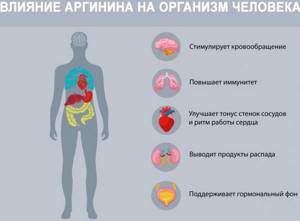
However, the effectiveness of arginine in these cases has not been proven. One study even found that taking this amino acid may even be potentially harmful for people who have had a heart attack.
Excessive amounts of arginine can also block the production of lysine, an amino acid used to treat herpes. People suffering from this disease should reduce their intake of this substance by avoiding foods high in it.
During pregnancy and breastfeeding
L-arginine is used in pregnancy for certain conditions, including preeclampsia. Supplementation of this amino acid in such cases is usually prescribed and supervised by a physician.
There is some evidence that L-arginine supplements can improve pregnancy and also support the health of the baby and mother. This is due to the fact that during pregnancy the body's need for the amino acid increases due to the development of the fetus and the growth of the placenta.
As a result, it cannot be satisfied through diet, especially in women living in low-resource settings and without access to protein-rich foods. However, taking supplements during pregnancy should always be approved and monitored by a physician.
The effects of L-arginine supplementation in breastfeeding women have not been studied. For this reason, taking the substance should only be started with the approval of a doctor.
For certain groups of people
The safety of L-arginine has been demonstrated for everyone, including pregnant women and the elderly. However, some people, including those with diseases affecting the liver or kidneys, should avoid taking this compound.
Arginine supplements are sometimes used in children in clinical settings and are considered safe when given in certain doses. However, their use by children should always be supervised by a doctor. It is not recommended to give L-arginine to your child unless medically necessary.
Beneficial features
Because L-arginine plays such an important role in the body, a deficiency of this amino acid can impair cell and organ function and lead to serious adverse health effects.
This connection is made in several ways. Thus, it can be synthesized from the amino acid citrulline by breaking down proteins or obtained by consuming protein in food.

Additionally, L-arginine can be obtained by taking supplements. They are widely available commercially and can be found in the form of powders, liquids, capsules and tablets. Although the safety of supplemental use of the substance has not been studied in detail, it is often recommended for people with conditions such as:
- protein deficiency;
- burns;
- infectious diseases;
- active sports and muscle building.
Supporting the body during serious illnesses
Arginine becomes essential when the body is in danger due to conditions such as infectious diseases and injuries. The need for this compound increases significantly due to changing physiological needs.
Under these conditions, the body can no longer synthesize arginine, so it must be obtained from external sources. Depletion of this amino acid during severe illness or after surgery leads to serious side effects, including impairment of immune function and blood flow. To avoid these potential complications, you need to take arginine supplements.
Helps move blood through arteries
Arginine is converted to nitric oxide during metabolism in the body. It is a neurotransmitter that helps arteries pump blood and improves overall circulation. Thus, it ensures the prevention of diseases of the cardiovascular system.
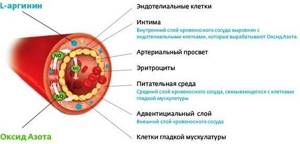
Experimental evidence has been obtained that arginine can improve blood flow in the arteries leading to the heart. This phenomenon can relieve blockage of blood vessels, chest pain, angina or coronary heart disease. It is beneficial for people with peripheral vascular disease and therefore poor blood flow to the extremities.
Helps treat erectile dysfunction
Considering the above mentioned effects of arginine, it can help men with erectile dysfunction. In many cases, the cause of this condition is related to heart disease. Problems with circulation in the arteries can reduce the flow of blood to the penis, which can prevent an erection.
According to some researchers, arginine supplements improve the movement of blood throughout the body. Because of this effect, doctors prescribe this compound to patients with erectile dysfunction.
Helps patients with type 2 diabetes
It has been proven that in patients with type 2 diabetes, the level of L-arginine in the body is reduced when compared with that of a healthy person. Therefore, its addition can restore the molecular imbalance in this disease.
Type 2 diabetes provokes oxidative stress in patients. One controlled human study confirms that arginine supplementation can reduce this manifestation of the disease.
At the same time, there is evidence that L-arginine indirectly activates a free radical scavenger protein, which helps reduce oxidative damage in the body. Additionally, its association with nitric oxide levels reduces damage caused by oxygen species.
Combined with lysine helps relieve anxiety
In one experiment, a combination of arginine and lysine was used for administration to people with increased anxiety. The subjects received 3 g of these substances per day. The results confirmed that during stressful situations, the test group released more hormones that reduce feelings of fear and anxiety.
The benefits of arginine for athletes
Arginine in food products, a table listing which contains an indication of its content in each of them, allows you to maintain good health with a properly formulated diet. Taking additional amounts of this substance is often practiced by those who want to take their performance to a higher level.
If a person exercises and gets enough rest, certain dietary supplements and protein may be recommended. These include arginine or L-citrulline, which is converted into arginine in the body. This compound has great benefits when playing sports due to its effects on the body.
Increases regeneration speed
After a strenuous workout, it is not uncommon to feel extremely exhausted and tired, resulting in several days required to fully recover. This is when arginine can help as it increases nitric oxide levels. This substance promotes blood flow to tissues, stimulating muscle relaxation.

This, in turn, helps deliver large doses of oxygen to muscle tissue. The most important condition for rapid regeneration is that the muscles receive enough nutrients after an intense workout, so improving blood flow is important. It is important to understand that this effect is only achievable with proper nutrition and fluid intake.
Increases endurance and reduces fatigue
Endurance is related to the amount of oxygen supplied to muscle tissue. It is carried in the blood, which helps you train longer without feeling tired.
Because arginine improves blood circulation, it can increase endurance and allow for improved athletic performance. This effect has been confirmed among professional cyclists and track and field athletes who experienced long periods of fatigue.
Promotes fat burning
Researchers have also begun to study the effects of L-arginine on accelerating fat loss. Athletes who are trying to cut their bodies should consider adding a dietary supplement containing this compound to their diet.
Researchers have also studied the effect of nitric oxide on glucose metabolism during exercise. The results showed that in athletes who took arginine, glucose entered the muscle cells much faster.
In addition, the addition of arginine to food causes an increase in the concentration of non-esterified fatty acids and glycerol. This means that the body burns fat as a source of energy.
How does L-arginine work?
There are times and situations when L-arginine cannot be produced in sufficient quantities by the body, for example, during illness. In addition, its amount in the body largely depends on age, gender, lifestyle, health status, bad habits, genetics and diet. With age, its amount decreases significantly, so it is often prescribed to older people. The bodies of young children are also unable to produce sufficient amounts of this acid.
One of the primary benefits of L-arginine is that it improves liver and immune system function. It promotes collagen production, which speeds up the wound healing process. It is necessary for normal metabolism in muscle tissue and increases weight loss by burning fat. It is used to treat male infertility. In sports nutrition, it is used to gain muscle mass, develop endurance and improve training performance.
Most of the arginine in the body is used to convert ammonia into the less toxic urea and to synthesize creatine and ornithine. A small part of it is used to produce nitric oxide (NO), a compound that dilates blood vessels, lowers blood pressure and improves heart function and vascular health. This is why supplements with this amino acid are often prescribed to increase the amount of nitric oxide produced.
Other benefits of L-arginine include:
- fights inflammation;
- reduces the risk of atherosclerosis and heart attack;
- increases the production of growth hormone;
- reduces inflammation of the digestive tract in premature babies;
- restores veins, capillaries and arteries;
- fights chronic heart failure and coronary heart disease;
- effective for hypertension;
- improves athletic performance and training efficiency;
- strengthens the functioning of the immune system;
- reduces muscle pain (after exercise or when arteries are blocked in the lower extremities);
- improves kidney function;
- improves mental abilities;
- effective for dementia;
- copes with impotence, erectile dysfunction in men, is used to treat male and female infertility, increases libido;
- helps with colds;
- good for skin and hair.
The benefits of L-arginine do not end there. It has important roles in neurotransmission, cell replication and combating oxidative stress.
Harmful properties
Oral or topical use of L-arginine is generally considered safe.
But in some cases, taking a substance can cause the following conditions:
- nausea;
- diarrhea;
- abdominal pain;
- bloating;
- allergic response;
- inflammation of the airways or worsening asthma symptoms;
- exacerbation of gout.
L-arginine is not recommended after a heart attack due to concerns that it may increase the risk of death. In addition, this dietary supplement may aggravate gout, allergies, or asthma. If you have these conditions, you should use it with caution.
You must be careful when taking L-arginine even if you have herpes in your body (including genital herpes). Consuming too much of this supplement could potentially activate the virus that causes these conditions.
Signs of a lack of arginine production

The following pathological processes may indicate amino acid deficiency in the body:
- frequent infections;
- skin and hair problems;
- hormonal imbalance;
- chronic fatigue;
- depression;
- cardiovascular diseases;
- high blood pressure;
- rapid aging of the body, which does not correspond to age;
- renal dysfunction;
- pain in the right hypochondrium characteristic of cholelithiasis;
- obesity;
- decrease in muscle tissue;
- growth retardation;
- decreased mental performance;
- problems with conception.
Side effects
Studies confirm that when arginine is consumed for 3 months, side effects are very rare. However, they may include nausea, cramps, abdominal pain and diarrhea, and headaches.
Arginine in food products (the comparison table contains its quantitative value in each of them) does not affect the effect of other dietary supplements and medications. However, consuming it as a dietary supplement along with other substances may cause unwanted effects in the body.
Arginine may react with medications, dietary supplements and herbal remedies taken for the following conditions:
- Anticoagulants and antiplatelet drugs that reduce blood clotting. Taking L-arginine with them may increase the risk of bleeding.
- Arginine can lower blood pressure in people with high levels. Combining it with hypertension medications increases the risk of your blood pressure dropping too much.
- L-arginine may reduce blood sugar in people with diabetes, so dosage adjustments may be necessary if taking medications with the same effect.
- Using the heart medications isoproterenol and nitroglycerin with arginine can cause your blood pressure to drop too much. The same effect can occur when arginine is taken simultaneously with sildenafil (Viagra and other drugs for erectile dysfunction contain it).
- Potassium-sparing diuretics (amiloride, spironolactone, or triamterene) should not be taken concomitantly with L-arginine. These medications can raise potassium levels, increasing the risk of developing hyperkalemia (excessive amounts of this mineral in the body).
Release forms and admission rules
Arginine is produced:
- in tablets and capsules in dosages of 500 mg, 750 mg and 1 g;
- in powder form;
- in bottles with 21% solution for injection.
The recommended dose for athletes and bodybuilders is 1 g/10 kg of weight, the maximum daily dose is 10 g. The dosage should be increased gradually, starting with minimal doses. Arginine injections should be prescribed by a doctor. Arginine is taken in courses with monthly breaks.
Arginine should be taken with food, dividing the daily amount into two doses. On training days, it is advisable to take the supplement 0.5 hours before training, as well as at night, to enhance the production of somatotropin, which is produced during sleep. Take with a glass (200 ml) of water.
The supplement can be combined well with creatine and other amino acids; arginine is also often included in pre-workout complexes.
Product table
Arginine in food products, a table listing which offers a comparison of its amount in each of them, is quite sufficient for most people. Additional additives based on this substance are not required.
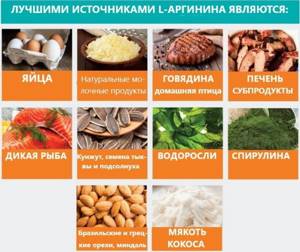
| Food | Arginine content (mg/100 g edible part) |
| Whole cow's milk | 130 |
| Egg | 94 |
| Beef | 1831 |
| Pork | 1684 |
| Mutton | 1398 |
| Chicken | 1410 |
| Halibut | 1520 |
| Cod | 3759 |
| Tuna | 1794 |
| Herring | 1304 |
| Mackerel | 1376 |
| Salmon | 1284 |
| Shrimps | 1882 |
| Soy flour | 2903 |
| Soya beans | 3153 |
| Wheat bran | 1098 |
| Rice | 174 |
| White bread | 308 |
| Beans | 370 |
| Lentils | 659 |
| Young peas | 708 |
| Broccoli | 176 |
| Cabbage | 140 |
| Mushrooms | 333 |
| Onion | 120 |
| Spinach | 324 |
| Almond | 1995 |
| Walnuts | 1580 |
| Hazelnut | 1310 |
| Spirulina | 4148 |
| Pumpkin seeds | 4033 |
| Peanut | 3349 |
As you can see, arginine is found in greater amounts in red and white meat, dairy products and fish. It is also present in large quantities in pumpkin seeds, soybeans, peanuts and other nuts, legumes (especially chickpeas and lentils) and algae (spirulina).
Meat
As one of the best sources of protein, meat contains all the amino acids the body needs, including arginine.
It is advisable to choose white varieties that are low in fat (in particular, turkey and chicken fillets). Among the red meats, the leader is beef, which offers 4.131 g in every 500 g of cooked product. However, be aware that it contains more fat than other protein sources.
Nuts
Arginine rich foods chart contains many types of nuts.
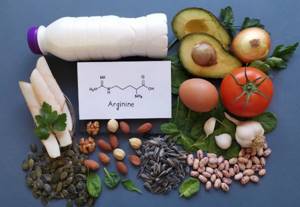
Among them, the best sources of this compound are:
- walnuts;
- hazelnut;
- pecan;
- peanut;
- almond;
- cashew nuts;
- Brazilian nut.
They are all rich in protein and are also an excellent source of fiber and essential vitamins.
Seeds
The seeds contain a significant amount of arginine. Pumpkin seeds contain one of the highest concentrations of this substance (1 cup of dried product contains 6.905 g of amino acid). Other seeds high in arginine include watermelon, sesame and sunflower.
Dairy
Dairy products (such as milk, yogurt and cheese) are important sources of arginine. Apart from this, they contain many other important nutrients such as protein, calcium, magnesium, vitamins (B1, B2, B6 and B12, as well as A, D and E) and folic acid.
There is an opinion that a high-protein diet containing a lot of dairy products in the menu allows you to achieve a lower body mass index.
Cereals and grains
Whole grains are a rich source of arginine and are believed to help lower blood cholesterol levels. Their antioxidant properties may also reduce the risk of heart disease.
Cereals high in arginine include:
- oats;
- corn;
- buckwheat;
- brown rice
Most adults produce adequate amounts of arginine, but children need to absorb additional amounts from foods to support growth and development. In addition, certain disorders can lead to a deficiency of this substance.
In this case, a person may need to include foods rich in arginine in their diet (it is advisable to be guided by a comparative table of products). Before taking dietary supplements with this amino acid, you should consult a doctor to avoid overdose or negative combination with other drugs.
